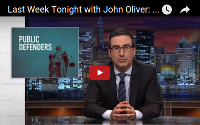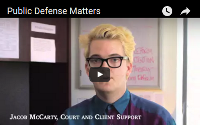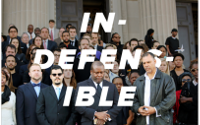The Justice Department recently signaled that it may be taking on a greater role in assuring the quality of indigent defense in state criminal systems. It filed a brief last month in a lawsuit brought by the American Civil Liberties Union of Washington against two towns for failing to provide adequate legal assistance for poor defendants.
The department's filing, reported byNPR, did not take a position on the merits of the plaintiffs' claim, but it starkly described what Attorney General Eric Holder Jr. has called the "state of crisis" in public defender systems nationwide. If the Washington plaintiffs prevail, the government's brief said, the court should appoint an independent monitor to help ensure that the two towns provide all defendants with effective counsel, a constitutionally protected right.
Mr. Holder has talked often about indigent defense, but because systemic problems traditionally have been dealt with at the state level, the federal government has maintained a limited role. That may be changing. State public defenders represent the vast majority of criminal defendants across the country, but, as the brief explained, they remain at a "staggering disadvantage" because of the resources that go to law enforcement and prosecutors' offices.
The disadvantage may be nowhere more glaring than in New Orleans, where indigent people sit in jail uncharged, sometimes for months, waiting for a lawyer whose workload far exceeds any reasonable standard. Professional guidelines recommend that public defenders handle no more than 400 misdemeanor cases in a year, yet a 2009 report found that part-time public defenders in Orleans Parish handled the equivalent of 19,000 misdemeanor cases per attorney annually — which means an average of about seven minutes spent by a lawyer on each case.
This terrible system is hobbled by a perverse funding mechanism. Traffic fines and court fees paid by defendants who are convicted or plead guilty account for nearly half of the annual budget of the Orleans Public Defenders Office. This is an unpredictable revenue stream, and it may also pose a conflict of interest since public defenders end up representing many defendants whose fines support their salaries.
Read more at The New York Times.




